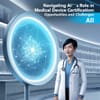As artificial intelligence continues to make strides in healthcare, its impact on medical device certification is becoming increasingly significant. While AI has the potential to enhance the development and approval processes for medical devices, it also brings forth a set of unique challenges that stakeholders must navigate.
AI technologies are transforming how medical devices are designed, tested, and monitored. By harnessing vast amounts of data, AI can improve diagnostic accuracy, personalize treatment options, and streamline operational efficiencies. For instance, AI algorithms can analyze patient data in real time, enabling devices to adapt and respond to individual needs.
However, integrating AI into medical devices complicates the certification process. Regulatory bodies, like the FDA, are working to understand and adapt their frameworks to accommodate these advanced technologies. Traditional methods of evaluation often struggle to keep pace with the rapid development of AI, raising questions about safety, effectiveness, and transparency.
One of the primary challenges lies in ensuring that AI models are robust and reliable. Unlike conventional devices, AI systems learn and evolve over time, which can make it difficult to predict their performance consistently. This dynamic nature necessitates new testing protocols and continuous monitoring to ensure compliance with safety standards.
Moreover, there’s the issue of data privacy and security. Medical devices powered by AI often rely on sensitive patient information, which raises concerns about data protection and ethical use. Ensuring that these devices meet strict data governance standards is essential to maintain patient trust and uphold regulatory requirements.
Despite these hurdles, the potential benefits of AI in medical device certification are too significant to overlook. By fostering collaboration between technology developers, regulatory agencies, and healthcare professionals, we can create a more adaptive framework that balances innovation with safety.
AI is reshaping the landscape of medical devices, it also challenges traditional certification processes. Embracing these changes requires a concerted effort from all stakeholders to ensure that as we advance in technology, we do so with a commitment to safety, ethics, and patient well-being.


